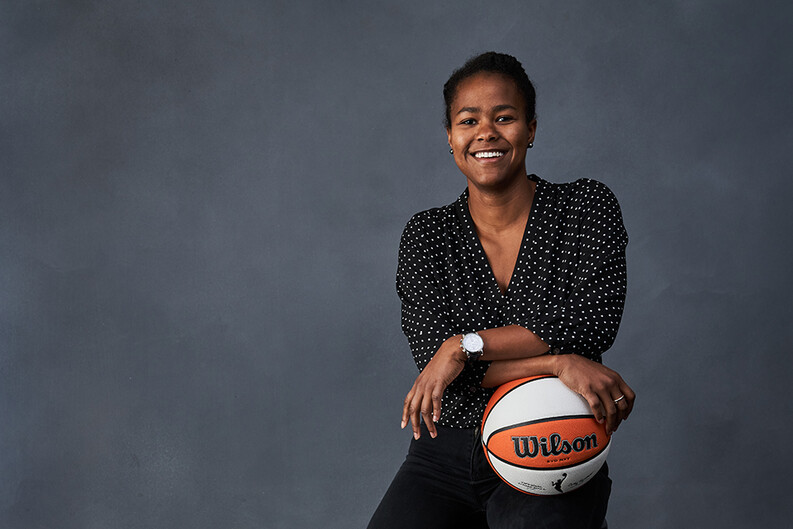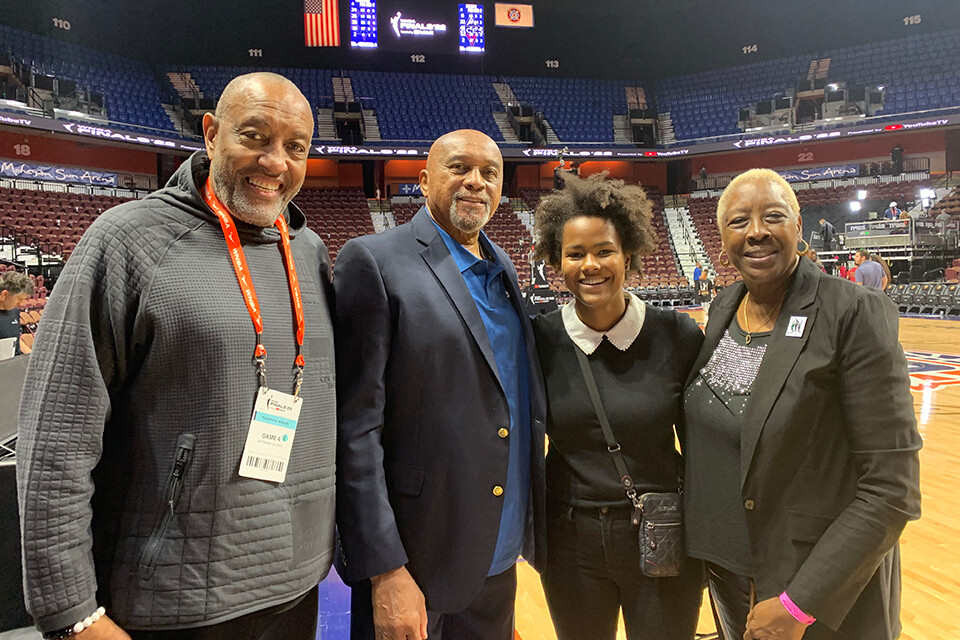Q&A: Liman Fellow Erin Drake ’20 on Protecting the Rights of WNBA Players

Erin Drake ’20 is a Liman Fellow4 at the Women’s National Basketball Players Association (WNBPA), the union for current women’s professional basketball players in the WNBA. In addition to being a Coker Fellow at Yale Law School, she worked at the Jerome N. Frank Legal Services Organization and served as a peer advocate and as a board member of Yale Law Women.
Part of the Arthur Liman Center for Public Interest Law5, Liman Fellowships support Yale Law School graduates working in the public interest.
What went into your decision to apply for a Liman Fellowship hosted by the WNBPA?
My Liman application for a fellowship at the WNBPA represents a moment of honesty about my interests and the decision to trust myself.
In June 2021, nearing the end of the first of two clerkships, I started to think about public interest fellowships as a potential next step for me. I spoke with friends who had gone through the process during law school, and I started to reflect on the legal and societal themes that had taken up space in my brain since graduating.
One Sunday, I found myself masked, sitting in the stands of Wintrust Arena, watching a WNBA game between the Chicago Sky (who went on to win the 2021 WNBA Finals) and the New York Liberty. Seeing stars like Candace Parker (who played under the legendary Pat Summitt at the University of Tennessee-Knoxville in my home state) and up-and-coming players like Kahleah Copper and Sabrina Ionescu was a treat. My enjoyment notwithstanding, I left the game with more than basketball on my mind.

The players — a group of athletes composed of women, queer people, mothers, and predominantly Black people — had led professional athletes in civic and political actions. Their efforts made the WNBA the first league to recognize the country’s civil unrest in 2020 on national television, contributed to the historic 2020 election of Sen. Raphael Warnock in Georgia, and ensured the focus of the “bubble” season — a condensed season that took place inside an isolation zone at IMG Academy in Bradenton, Florida, due to the COVID pandemic — remained on racial justice by reverberating calls of “Say Her Name” and “Black Lives Matter.”
I felt a deep sense of energy toward these players not only because of their civic and political engagement, but also because I recognized them as leaders who were not adequately invested in at work.
I probably should have started writing a fellowship application that evening. Instead, I filed these observations away, unconvinced that I could make this project happen for lack of funding and a point of contact. However, when I started to have more conversations with family, friends, mentors, and professors about what to do after my clerkships, it was obvious that the only thing I was excited about was my interest in working on racial, gender, and worker justice issues for the WNBPA. Thankfully, the people who I spoke to validated the potential of this idea and offered me invaluable help in fleshing out my project, getting in touch with the Executive Director of the WNBPA, and eventually submitting an application. Those initial conversations gave me the confidence to be honest about where I wanted to be professionally and why I felt capable to be there.
Truthfully, I was unsure whether the Liman Fellowship — or any other fellowship — would appreciate this kind of project. When I was a Yale Law School student, the Liman Workshops6 focused on the criminal legal system, and despite my knowledge about the relationship between the law, organizing, political action and advocacy, performance theory, political economy, civil rights, and sports, I worried that the fellowship committee would not understand “the why” for my project. But after speaking to dozens of YLS fellowship recipients (an invaluable exercise in general) and reading new scholarship on the labor movement and strategies to increase the communal benefits of collective bargaining agreements, I realized my worry was unfounded. Liman offered the freedom and community to think through the multitude of academic and practical themes existing within my proposal in addition to funding. I just needed time to realize it.
What kinds of issues are you exploring?
A lot of my work has been assessing how certain rights and entitlements secured in the 2020 collective bargaining agreement have played out in practice and developing strategies based on those assessments for the upcoming season. This often involves talking to players, agents, and league representatives; developing charts and tracking documents; and writing reports or memos for the union staff about potential actions or responses. The 2023 season starts in May and will provide an opportunity to think through workplace accommodations more specifically. I’ve also consulted with a number of workers’ compensation attorneys across the country, collaborated with other professional sports unions, and delved into international human rights law and unlawful detainment.
“I felt a deep sense of energy toward these players not only because of their civic and political engagement, but also because I recognized them as leaders who were not adequately invested in at work.”
— Erin Drake ’20
Other work has been more public facing and forced me to grapple with questions of how to build consistent and galvanizing narratives to achieve long-term strategic goals amid various audiences and the prospect of leaks. Whether I’m writing press releases, letters, scripts for social media content, or revising organizational language, my focus is on how to powerfully capture the players’ articulations about their political and societal commitments within the broader context of change movements and the current iteration of the labor movement. Another aspect of my work includes tracking messaging, legislative bills, and trends in the state legislators of the twelve states in which the league operates (Georgia, Illinois, Connecticut, Indiana, New York, D.C., Texas, Nevada, California, Minnesota, Arizona, and Washington) for potential organizing opportunities and awareness of the effects of these laws on the players and the communities they represent.
Finally, I spend a lot of my time soaking up as much information as I can about sports as an industry and how it perpetuates and upends aspects of society. The WNBPA defies many of the limitations placed on its membership through a commitment to core labor and organizing principles yet operates within an industry of fame and celebrity. Navigating this dynamic has been a daily exercise and yielded ideas I hope to explore in the future.
How has your project evolved since you started? Have there been any surprises?
My project is constantly evolving. This can be a challenge in some ways but poses an opportunity for me to be creative. I underestimated the specificity (and the subsequent learning curve) of the sports industry. From the role of agents in players’ lives to challenges with the league, barriers to some of my ideas are simply out of the union’s hands. Thus, I have had to consider some strategic changes to my ideas in consultation with union staff to have a chance to achieve similar end goals via different means.
I’ve been pleasantly surprised by how much I have been asked to write in this role and how open the staff has been to giving me ownership over certain tasks or ideas given that I am their first-ever legal fellow. The lack of precedent has been a gift.
What do you hope to gain from this experience?
I hope that this fellowship helps me understand the work of change-making and representation in an environment that is not traditional representative politics. In addition, I feel that sports and entertainment, for better and worse, function as a center of society, maybe even a fourth branch of government. If that is the case, what role do public interest lawyers, who are traditionally more proximate to the spaces where traditional legal change and interventions occur, play in aiding talented, young athletes in the shared goal of building power toward a more equitable society and democracy? This fellowship and the people I have met through it have already helped me understand this central question and given me knowledge I intend to build on at the conclusion of my fellowship year.


